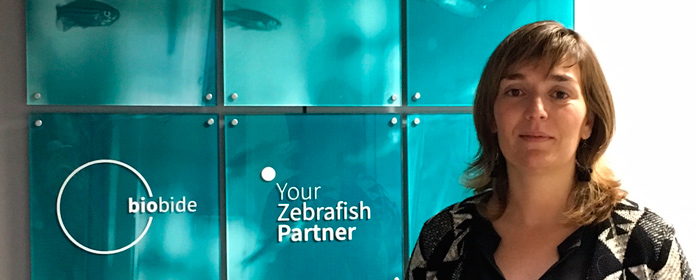"Personalized medicine to treat and prevent disease is going to be a reality soon."
Arantza Muriana (FAR 99 and MIDI 02), co-founder of Biobide, a preclinical services business specialized in the zebrafish animal model , participates in the MIDI Meetings.

PHOTO: Courtesy
This coming Friday, 25th, the Meetings of the Master's Degree in research, development and Drug Innovation (MIDI) will have a new guest, the former student and entrepreneur Arantza Muriana. Arantza is co-founder of business Biobide, an initiative with a strong international vocation specialized in the zebrafish animal model to provide preclinical services.
- What do you do at Biobide and how was your business idea born?
Biobide is a Contract Research Organization (CRO) of preclinical services specialized in the model zebrafish animal. We offer toxicity and efficacy tests with the zebrafish alternative model , which allows working under 3 R's (Replacement, Reducement, and Refinement), reducing the use of animals and making a more ethical use of them. All this because the zebrafish is not considered an animal until approximately 5 days after it leaves the chorion and begins to feed itself. The business idea arose from combining the knowledge and experience of Dr. Juan Carlos Ispizua, a professor at Salk Lake City in California and an expert in zebrafish, and staff from the engineering and automation branch of the Mondragon Corporation, who saw that by applying automation to zebrafish they could obtain the benefits of in vitro tests for automation and mass testing, with in vivo tests, to obtain more complex information from a whole animal.
- How do you consider that your training contributed to your professional development ?
I studied the degree program of Pharmacy at the University of Navarra and later returned to study the Master of research and development+i of Medicines (MIDI). The degree program of Pharmacy gives you a vision of the whole process of finding of a drug as well as knowledge of pharmacology, Chemistry pharmaceutical, Quality, IP and others necessary to work in a business that provides services mainly to pharmaceutical and biotech companies.
- What about MIDI, what would you say it did for you in driving your own business?
Above all, it was MIDI that allowed me to see the big picture and learn more in detail about each specific area of the pharmaceutical industry. In terms of entrepreneurship, or the management of a business it gave me tools to know how to further educate myself and help me to look for an MBA oriented to strengthen the areas in which I was limited in the daily management .
- How would you advise a student who is thinking of taking the MIDI next year to do so?
I would tell them that if they are sure that they want to work in the pharmaceutical industry, don't doubt that it will provide them with the necessary knowledge to do so. And choose very well how and where you want to do your TFM because it can give you the opportunity to start specializing and learn about the applied side of what you think you like and even discover what you are passionate about.
- At what level is biotechnology in Spain? What percentage of your work is directed abroad?
Biotechnology in Spain has grown a lot in the past, especially in the Basque Country and Navarra, but unfortunately we have not reached the level of the leading countries and the general crisis has also affected us. However, we are making progress and I think we will make more progress in the near future. Fortunately, Biobide was born with an international vocation and it has always been clear to us that our market is global. An example of this is that our first invoice was to a European client and the last one to an American one. In fact, only 5% of our clients are national, and we work mainly with multinational pharmaceutical, chemical and cosmetic companies with headquarters in Europe and the United States,
Precisely for this reason, last year we opened a subsidiary in the USA, mainly due to the partnership with the National Institute of Environmental Health Sciences (NIEHS), a very prestigious American health institution with which very few Spanish companies have obtained a contract of this subject. On the other hand, Biobide belongs since 2014 to group Bionaturis, a biotech signature which, in addition to the headquarters in Europe and USA, has founded a subsidiary in China aimed at development and marketing its products and services -including those of Biobide- in Southeast Asia. Being where our customers are improves the working relationship, although working with international customers is easier nowadays thanks to new technologies and the global market.
- What major challenges do you think you are going to face in the world of biotechnology?
I believe that personalized medicine will soon be a reality and, in addition to treating diseases, we will work on disease prevention, since aging and quality of life will be our main concern. In addition, new technologies - with robotics, telecommunications or 3D organs - will emerge and solve problems in ways that are now unimaginable.
